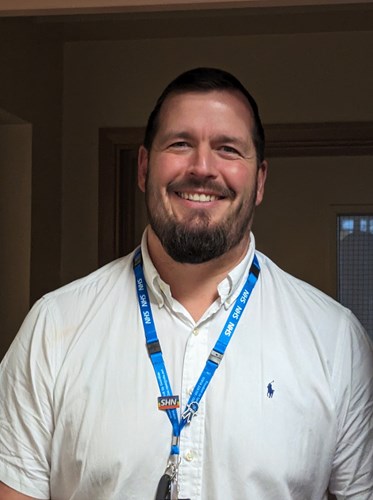International Neurodiversity Week - "I thought I was stupid or lazy because I struggled at work"

Matt Cope wrongly thought he was stupid or lazy because he struggled at school.
So he hid his learning differences but didn’t let them hold him back.
Being diagnosed with dyslexia in his early 30s helped him to find ways of overcoming these challenges and to talk more openly about them.
His own experience, and having an older brother with learning difficulties, mean he is especially keen to help others in the same position to find work.
As a HR business partner at Essex Partnership University NHS Foundation Trust (EPUT), Matt helped to organise the Trust’s first inclusive recruitment event, which was aimed at supporting adults with mild learning disabilities and/or autism looking to work in the NHS.
Matt shares his story as part of Neurodiversity Celebration Week (18 to 24 March).
“I honestly thought I was a lazy writer and lazy reader.
“My dad is a very successful author and me and my siblings were always encouraged to go into higher education.
“I always tried hard at school but just really struggled.
“I did business studies at college with my sister and five other people and I was the only one in my class who failed the first assignment.
“It was politics, a topic I was really interested in, and I thought I would do okay. I nearly quit the course but my family told me to persevere and they tried to help me with my writing, for example, checking how I formed my sentences and proofreading my work.
“After college, I did a number of jobs including retail, sales, labouring, security, cooking, and working in a bar.
“My dyslexia – which I didn’t know I had at that point – stopped me from going to university.
“Instead, I started a business degree at night school in 2007. So I was working during the day at an events company and attending classes from 6pm to 9pm for six years.
“I finished my degree in 2013 and got a 2:2.
“I then started a Chartered Institute of Personnel and Development (CIPD) qualification and became a Human Resources advisor a year later.
“I completed a Masters in HR through the CIPD in 2016 and was promoted to HR Business Partner in 2017.
“My manager, Freya Whiting, gave me really good feedback and noticed that if I received an email, I wouldn’t read it all but would only pick up on certain bits, and I would repeat myself in reports.
“I also had a habit of using big, complicated words because I thought it sounded better.
“My manager encouraged me to speak to someone to check if I had dyslexia. I went to a local education centre and was diagnosed in 2016 when I was 31.
“I was really embarrassed, I told very few people.
“I then took some courses to help me, including a report writing course about how to simplify reports and understand communication.
“I followed a neurodiverse specialist on LinkedIn who said dyslexia is a hidden learning difficulty and people who have it tend to have other superpowers.
“So I focused on the skills I’m good at, such as my interpersonal skills and my ability to communicate verbally.
“I started to talk more openly about it and after giving a presentation at work about my experiences, I remember two colleagues saying I had inspired them to go into higher education.
“I let colleagues know that I have dyslexia and I accept I need to take more time to do certain things. I think you also need to be comfortable to make mistakes. If you’re honest with people, they’re more likely to be understanding.
“I am hesitant about putting myself forward for certain tasks, such as those where there’s lots of information that needs analysing and simplifying.
“But my dad gave me good advice to just start writing to get used to it, so in my spare time I write movie reviews and my friend and dad will check them for me.
“At EPUT, I was involved in organising our first inclusive recruitment roadshow last month in Epping, working with Essex Cares Limited and Mid and South Essex NHS Foundation Trust.
“Fifteen people with mild learning disabilities and/or autism attended and we spoke to them about the job opportunities we have at EPUT and gave them advice on applying for jobs and going for interviews.
“Everyone had a chance to interview for a job and we have offered four people a job and offered work experience to everyone who attended.
“It was a pilot project and we hope to do more in the future.
“It’s really important to me that we encourage people because I don’t think we do enough in the NHS to recruit people with learning disabilities and autism. There are too many barriers in the application and interview process.
“My older brother Michael has a learning disability and has worked at Asda for years as a trolley collector. He is a great worker and is really popular with the staff and customers.
“I have been to events where I have seen people like Michael who are desperate to find a job. He loves working and he’s always happy, and we have such a wide variety of jobs in the NHS that people would gladly do.
“We just need to remove the barriers to help them.”
Where to get more support and information
Below are some websites to find out more about dyslexia
Neurodiversity Celebration Week website
#WeCare - We want everyone who uses our services to have the best possible experience. Our care will be therapeutic, tailored to each patient’s individual needs, and focus on what they need to feel better.
Our five-year Strategic Plan sets out our priorities and commitments to deliver the highest quality and safest care possible.
